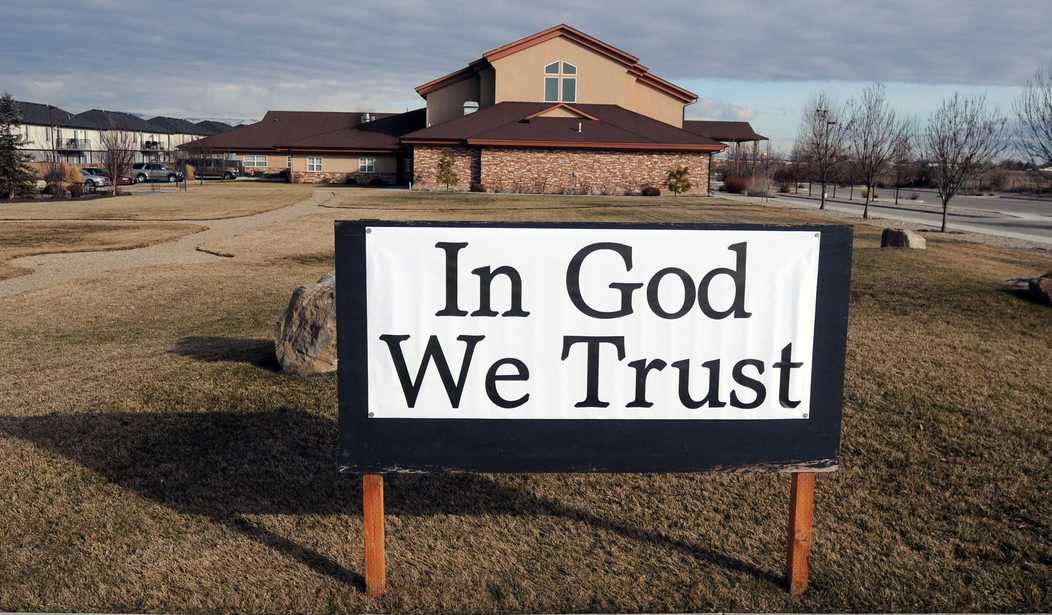Minnesota Sen. Dan Hall doesn’t think it will be a “cure-all” to restore what he sees as a lack of “respect or appreciation” for the nation’s history, police and even parents. But allowing local schools to post the words “In God We Trust,” the Republican said, would be a good start.
So, he tacked an amendment onto an education funding bill May 1 that allows public school boards to prominently display the nation’s motto “In God We Trust” in their classrooms, offices, and other facilities, and find nonpublic funding to pay for it.
“This legislation simply makes it clear that putting up our National Motto on the walls of our schools is no different than saying the Pledge of Allegiance in the schools,” Hall, a former police and fire chaplain, said.
“It seems like God and country are no longer lifted in places of honor,” Hall said. “Too often God and country are seen as subjects of jokes or ridicule.”
If the state House approves the education funding package, with the amendment intact, Minnesota would not be the first state to allow educators to post “In God We Trust” in classrooms and other school facilities.
A new Florida law takes effect July 1 that goes beyond what the Minnesota Senate approved. Under the Sunshine State’s new law, public schools would be required to display the motto in all of their buildings “in a conspicuous place.”
State Rep. Kimberly Daniels, a Democrat who sponsored the legislation in Florida, said she did so partly in response to the February Parkland school shooting that claimed the lives of 17 people.
“When we remove God,” Daniels said, “we remove hope.”
Legislatures in Arkansas and Tennessee approved similar legislation this year.
Louisiana lawmakers sent “In God We Trust” legislation to a Senate committee in April.
“This country was definitely built on a Christian foundation,” said Sen. Regina Barrow (D), who sponsored the legislation in Louisiana. “That’s one of the things that I think our forefathers never wanted us to lose sight of.”
Frederick Clarkson, a senior policy analyst at the self-described social justice think tank Political Research Associates, said Hall’s legislation, like the rest, is just one more knock-off of model legislation written as part of an effort called “Project Blitz.”
Clarkson wrote in Religion Dispatches that the intent of Project Blitz is to do for the Christian right what the American Legislative Exchange Council (ALEC) did for pro-business groups.
“The bills are seemingly unrelated and range widely in content—from requiring public schools to display the national motto ‘In God We Trust’ to legalizing discrimination against LGBTQ people; to religious exemptions regarding women’s reproductive health,” Clarkson wrote.
“Project Blitz brings something new and dramatic to the Christian Right as it continues to mature as a political movement,” Clarkson added.
No matter where Hall’s legislation came from, August Berkshire, a board member of Minnesota Atheists, is worried about its impact in his state. He said it should not be up to the Minnesota Legislature or even a local school district to “be taking sides in a very personal decision.”
“It violates the separation of church and state by making it look like the school takes an official position of whether a God exists,” Berkshire said.
Minnesota Democrats, like state Sen. John Marty, agreed and tried, but failed, to stop Hall’s amendment.
Marty said during the Senate debate that while he believes in “a God” he does not think that “a government-sanctioned motto” would “strengthen our religion.”
“It demeans and devalues and cheapens our religion,” Marty argued, speaking, he said, for the 79 percent of Americans who “believe in some Supreme Being,” and the 21 percent who do not.
“The God I worship made a big point about fighting against power and money,” Marty said. “I don’t want that motto on our money. I don’t want it in our public schools.”
Another Democrat, Sen. Scott Dibble, complained that posting the words “In God We Trust” in a school would demonstrate to non-Christians their beliefs would neither be tolerated nor respected.
Dibble offered an amendment that would have replaced “God” with “Yahweh,” which is the word for God in the Jewish faith. Dibble’s amendment died on a voice vote. He then offered amendments that would have replaced “God” with “Allah” and “Krishna.” Those also failed.
Hall told Dibble during the Senate floor debate that it would be better to use “God” in the amendment because it was “more generic” and could be applied to the Supreme Being in many religions.
“That is where your argument falls right down on its face,” Dibble responded. “The word ‘God’ is not generic to all. It is a specific Christian and European derivative.”
But Republican Sen. Eric Pratt argued the motto In God We Trust does not point to any religion or even a Christian God. He said the phrase points to the idea of God as it is found in the Declaration of Independence.
“I see no reason,” Pratt said, “why we should be offended by celebrating who we are as a country.”








Join the conversation as a VIP Member